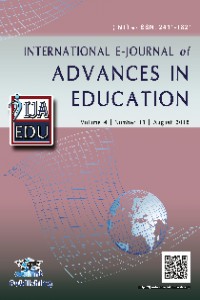Abstract
References
- Abu-Jarad, H. (2008). Evaluation grammar development through longitudinal error analysis. Al-Aqsa University Journal, vol. 2 (2), pp. 54-68. http://www.alaqsa.edu.ps/ar/aqsa_magazine/files/178.pdf Barkhuizen, G. (2004). Social Influences on Language Learning. In Davies A. & Elder, C. (Eds.), The Handbook Of Applied Linguistics. Oxford, Blackwell Publishing (pp.552-558). UK (ISBN: 0–631–22899–3) Diab, N. (1996). The transfer of Arabic in the English writings of Lebanese students. The ESP, São Paulo, vol.18 (1), pp. 71-83. http://lael.pucsp.br/especialist/181diab.ps.pdf Ellis, R., & Barkhuizen, G. (2009). Analysing Learner Language. Oxford University Press (ISBN: 13 978 0 194316347) Halliday, M.A.K. (2004). Introduction To Functional Grammar. 3rd ed. Revised by Christian M.I.M. Matthiessen. London (ISBN: 0240761679) Hamdi, S. (2017). An Analysis of Written Grammatical Errors of Tunisian Learners of English in EFL Context http://web.aou.edu.lb/images/stories/lebanon/Research/CALR/issuefour/article Larsen-Freeman, D. (1991). Teaching grammar. In Celce-Murcia, M. (Ed.),Teaching English As A Second Or Foreign Language (2nd ed.) (pp. 279-295). Boston, MA: Heinle and Heinle Publishers. Mahmoud, A. (August 2011). The role of Interlingual and intra-lingual transfer in learner-centered EFL vocabulary instruction. AWEJ, vol. 2 (3), pp. 28-49. Department of English, College of Arts, Sultan Qaboos University https://www.researchgate.net/...Role_of_Interlingual_and_Intralingual_Transfer_in_L. Ryding, Karin. (2010). A Reference Grammar Of Modern Standard Arabic. Cambridge University Press, pp.736 (ISBN: 100-521-77771-2) Selinker, L. (1972). Interlanguage. In J. C. Richards (Ed.), Error Analysis: Perspectives on Second Language Acquisition, (pp. 31-54). London: Longman Group UK Limited Shammas, Nafez A. (2010). Problems encountered by MA translation students at Arab Universities. The Second Jordan International Conference on Translation (JICOT 2), Petra University. https://www.uop.edu.jo/download/JICOT2/Abstracts2JICOT44.pdf Takač, V. (2008). Vocabulary Learning Strategies and Foreign Language Acquisition. Singleton, D. (Ed.), Great Britain: the Cromwell Press Ltd. (ISBN: 13 978-1-84769-038-8 pbk) Tarone, E. (2006). Interlanguage. Elsevier Ltd. reproduced from the previous edition, volume 4, pp. 1715–1719, _ 1994, Elsevier Ltd. Wei, X. (June, 2008). Implication of IL fossilization in second language acquisition. English Language Teaching, vol. 1 (1). http://www.ccsenet.org/journal/index.php/elt/article/download/523/504
THE SOCIAL INFLUENCE OF MODERN STANDARD ARABIC ON THE USE OF ENGLISH VERBS IN THE ESSAYS OF LEBANESE HIGH SCHOOL EFL LEARNERS
Abstract
An intricate area in EFL for many Lebanese Arabic speaking learners I’ve met is the proper use of English verbs. Their essays usually reflect a systematic use of verbless sentences, erroneous tenses, and transliterated expressions that might alter the whole concept of the intended communication. The aim of this study is to map the erroneous use of English verbs in essays written by Lebanese third secondary EFL learners, to analyze the source of these errors, to correlate it to the social influence, the transfer from their native language, Modern Standard Arabic, and to contribute to EFL research in the Lebanese context. To analyze errors of the corpus data quantitatively and qualitatively, Error Analysis, an important technique in the field of second language acquisition based on Ellis & Barkhuizen’s (2009) approach was performed. Then errors such as: temporal and modal verb operators, auxiliaries, the infinitive form of verbs, passive voice operator, conditional forms, were identified, counted, reconstructed, their linguistic taxonomy and surface structure taxonomy was defined. Finally, to determine the source of these errors, verbs in English Functional Grammar (EFG) (Halliday, 2004) and Modern Standard Arabic (MSA) (Ryding, 2010) were analyzed contrastively. The findings revealed that the verbal category formed 35% of all their Interlingual errors. If attention is not turned to the notion of Interlanguage now, our learners will get stuck into fossilization, fail to overcome their weakness; later on, they will be carrying it with them to the university level. Suggestions for how to reconsider modern teaching methodology were addressed to specialized authorities, curriculum designers and EFL teachers.
References
- Abu-Jarad, H. (2008). Evaluation grammar development through longitudinal error analysis. Al-Aqsa University Journal, vol. 2 (2), pp. 54-68. http://www.alaqsa.edu.ps/ar/aqsa_magazine/files/178.pdf Barkhuizen, G. (2004). Social Influences on Language Learning. In Davies A. & Elder, C. (Eds.), The Handbook Of Applied Linguistics. Oxford, Blackwell Publishing (pp.552-558). UK (ISBN: 0–631–22899–3) Diab, N. (1996). The transfer of Arabic in the English writings of Lebanese students. The ESP, São Paulo, vol.18 (1), pp. 71-83. http://lael.pucsp.br/especialist/181diab.ps.pdf Ellis, R., & Barkhuizen, G. (2009). Analysing Learner Language. Oxford University Press (ISBN: 13 978 0 194316347) Halliday, M.A.K. (2004). Introduction To Functional Grammar. 3rd ed. Revised by Christian M.I.M. Matthiessen. London (ISBN: 0240761679) Hamdi, S. (2017). An Analysis of Written Grammatical Errors of Tunisian Learners of English in EFL Context http://web.aou.edu.lb/images/stories/lebanon/Research/CALR/issuefour/article Larsen-Freeman, D. (1991). Teaching grammar. In Celce-Murcia, M. (Ed.),Teaching English As A Second Or Foreign Language (2nd ed.) (pp. 279-295). Boston, MA: Heinle and Heinle Publishers. Mahmoud, A. (August 2011). The role of Interlingual and intra-lingual transfer in learner-centered EFL vocabulary instruction. AWEJ, vol. 2 (3), pp. 28-49. Department of English, College of Arts, Sultan Qaboos University https://www.researchgate.net/...Role_of_Interlingual_and_Intralingual_Transfer_in_L. Ryding, Karin. (2010). A Reference Grammar Of Modern Standard Arabic. Cambridge University Press, pp.736 (ISBN: 100-521-77771-2) Selinker, L. (1972). Interlanguage. In J. C. Richards (Ed.), Error Analysis: Perspectives on Second Language Acquisition, (pp. 31-54). London: Longman Group UK Limited Shammas, Nafez A. (2010). Problems encountered by MA translation students at Arab Universities. The Second Jordan International Conference on Translation (JICOT 2), Petra University. https://www.uop.edu.jo/download/JICOT2/Abstracts2JICOT44.pdf Takač, V. (2008). Vocabulary Learning Strategies and Foreign Language Acquisition. Singleton, D. (Ed.), Great Britain: the Cromwell Press Ltd. (ISBN: 13 978-1-84769-038-8 pbk) Tarone, E. (2006). Interlanguage. Elsevier Ltd. reproduced from the previous edition, volume 4, pp. 1715–1719, _ 1994, Elsevier Ltd. Wei, X. (June, 2008). Implication of IL fossilization in second language acquisition. English Language Teaching, vol. 1 (1). http://www.ccsenet.org/journal/index.php/elt/article/download/523/504
Details
| Primary Language | English |
|---|---|
| Journal Section | Articles |
| Authors | |
| Publication Date | August 27, 2018 |
| Submission Date | June 3, 2018 |
| Published in Issue | Year 2018 Volume: 4 Issue: 11 |
Published and Sponsored by OCERINT International © 2015 - 2025
Contact: ijaedujournal@hotmail.com
International E-Journal of Advances in Education by IJAEDU is licensed under a Creative Commons Attribution-NonCommercial 4.0 International License. Permissions beyond the scope of this license may be available at http://ijaedu.ocerintjournals.org


